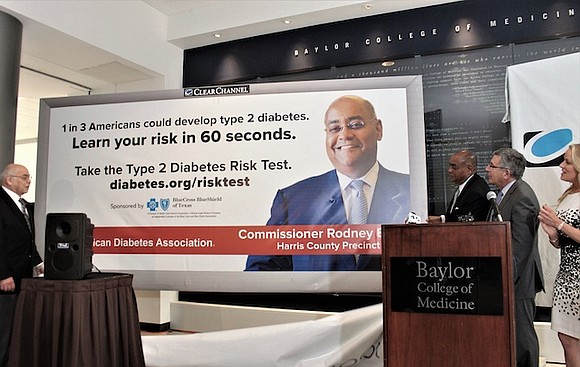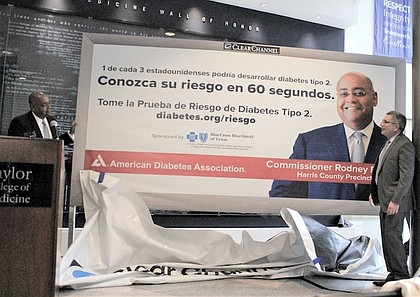American Diabetes Association Announces Risk Test Campaign in Partnership with Harris County Precinct One Commissioner Rodney Ellis
Style Magazine Newswire | 4/10/2019, 12:09 p.m.

Precinct One Harris County Commissioner Rodney Ellis, the American Diabetes Association (ADA) and members of the medical profession on Wednesday, April 3 announced a campaign to inform people about a 60-second online “Know Your Risk” test for type 2 diabetes.
The campaign, spearheaded by ADA, also is being promoted in Precinct One on 25 billboards co-sponsored by Blue Cross Blue Shield and Clear Channel Outdoor Americas.
“Diabetes type 2 is preventable and treatable if people know their risk and have the resources to take action to prevent or treat diabetes,” Commissioner Ellis said. “This public service campaign is needed in Precinct One because we have several communities at high risk. Type 2 diabetes disproportionately affects communities of color, seniors and other underserved communities.”
Said Melissa Edwards, executive director of Central South Texas ADA: “Today is an example of community partners working together to help our neighbors know their risk for type 2 diabetes. The American Diabetes Association is proud to partner and share our free online type 2 diabetes risk test that takes 60 seconds to complete and, if you are at risk, connect you to online and in-person resources within a 25-mile radius of your ZIP code.”
The billboards, in English and Spanish, were unveiled at a news conference Wednesday at Baylor College of Medicine–Cullen Building.
“Clear Channel Outdoor Americas is pleased to be a part of this program to reach the public with this lifesaving message,” said Lee Vela, vice president for public affairs at Clear Channel Outdoor. “This message will be displayed on 25 traditional billboards in Harris County Precinct One and up to 12 digital billboards in other parts of the county – all of which will create millions of market impressions. It is our sincere hope that this message reaches those who are in danger of developing diabetes.”
Diabetes is the seventh leading cause of death in the U.S. Also, 1 in 11 Americans has diabetes and 86 million are at risk.
In Texas, 14.6% of the adult population have diabetes, according to the ADA. Harris County has an average prevalence rate of 12% while neighborhoods like Kashmere Gardens and Acres Homes in Precinct One have prevalence rates between 20% and 24%, underscoring the need for this public service campaign.
Dr. Ashok Balasubramanyam, professor of medicine in diabetes, endocrinology and metabolism at Baylor College of Medicine, said the risk score is extremely accurate and it can help guide a person to the next step. He said everyone is somewhere at the risk stage and at some point “we all start going down that slope that ends up with complications of diabetes.”
”That’s the bad news,” he said. “But the good news is that no matter where you are on that slope, there are great studies, many of which we participated in, that show you can actually keep on decreasing that risk. If you are sliding downhill, you can actually push your way back up to the top of the hill back to health. That can happen at any level of risk.”
Joy Ashby Cornthwaite, registered dietitian and diabetes educator at McGovern Medical School at UT Health Science Center, said people can decrease their risk of developing diabetes or manage the disease if they change their lifestyle by being physically active and eating healthier, including fruits and vegetables.
“Once you know, you can’t un-know,” she said. “But also once you know, you can change. You’ll be able to make choices that arm yourself with the knowledge, with the skills, with the resources and then with the extended support to help you live a long and healthy life.”
Dr. Jerald L. Zarin, medical director of Medicaid and government programs at Blue Cross Blue Shield of Texas, said: “This initiative has the potential to have a tremendous impact on the health of many people in the Houston-Harris County region. Early detection of pre-diabetes and diabetes is critical to preventing and managing the disease.”
People can take the test online at diabetes.org/risktest.
“Once you know if you are at risk, you can take simple steps, such as daily exercise and losing weight, to reduce your risk for developing type 2 diabetes,” Commissioner Ellis said. “Your health is too important to not know your risk.”




